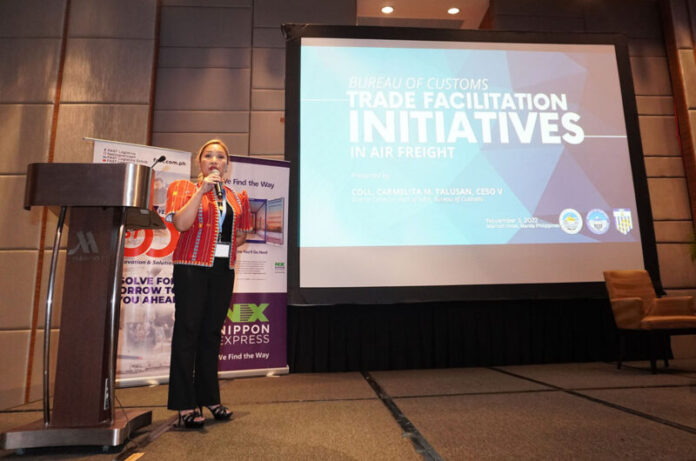
-
The Bureau of Customs-Port of Ninoy Aquino International Airport district collector says she will push for the adoption of electronic air waybill to streamline processes and speed up air cargo clearance
-
District collector Carmelita Talusan says e-AWB use will help eliminate human error and additional costs, and allow for easy access to records
-
The International Air Transport Association welcomed the announcement, saying the e-AWB will support BOC’s automation initiative
Bureau of Customs-Ninoy Aquino International Airport (BOC-NAIA) district collector Carmelita Talusan said she would help push for the adoption of the electronic air waybill (e-AWB), an initiative of the International Air Transport Association (IATA), during a presentation at the first Philippines Air Cargo Day event on November 3.
Noting that some stakeholders still use traditional manual processing, she said adopting the e-AWB is needed at Philippine airports to streamline processes and speed up air cargo clearance. It also dovetails with the BOC’s push for digitalization, she added.
Adopting the e-AWB will help eliminate errors in the declaration and invoicing, do away with additional costs, and make records more accessible.
BOC-NAIA handles most of the country’s air cargo shipments as its jurisdiction covers the main gateway, NAIA, other air cargo facilities, and special economic zones.
In an interview with PortCalls on the sidelines of the event, Talusan said she could help initiate talks with BOC’s top officials and revisit previous proposals for the adoption of e-AWB.
Since the Philippines ratified 2015 the Montreal Convention of 1999, or the Convention for the Unification of Certain Rules for International Carriage by Air, it has established the legal framework to adopt the use of electronic documentation for shipments to reduce costs and increase efficiency.
IATA introduced electronic versions of MAWB (e-AWB) in 2010 to initiate the digitalization of the air cargo supply chain. Ever since, the e-AWB initiative has been a key enabler to the digitalization and transformation of our industry, as data availability and quality is critical to deliver innovative solutions and enhancing customer experience. On January 1, 2019, e-AWB became the default contract of carriage for all air cargo shipments on enabled trade lanes. In Asia Pacific, 11 key markets have already adopted e-AWB.
IATA has for years pushed for the adoption of e-AWB in the Philippines and has urged airlines to implement the measure even while BOC is not yet on board the initiative.
RELATED READ: Immediate adoption of e-AWB in PH urged
“I’m pleased to hear that we have the support now from Customs to move this forward,” David Wee, IATA Asia Pacific regional cargo manager said in a presentation during the Philippines Air Cargo Day event.
Today, airlines and forwarders in the Philippines are doing duplicate work, submitting paper MAWB and e-AWB to fulfill local and global regulatory requirements. Other markets that have adopted e-AWB, only submit data, and this has enabled the processes to be more digitalized allowing stakeholders to be more cost-efficient in developing innovations and business continuity plans.
IATA Philippines country manager Samuel David, in an interview with PortCalls on the sidelines of the conference, echoed Wee’s sentiment.
“We look forward to implementing the e-air waybill in the Philippines. This will help support the automation initiatives of the Bureau of Customs, and it will also certainly help traders as they enter the digitalized era,” David said.
He noted that airlines are already implementing the e-AWB in their systems but BOC still needs to recognize the e-AWB as the default AWB.
David said implementing e-AWB is only the first step to digitalization, there are twelve core air cargo shipping documents and we should continue our efforts to make our entire air cargo process paperless by digitalizing all the core documents. This will improve the Philippines’ competitiveness with other markets. – Roumina Pablo




